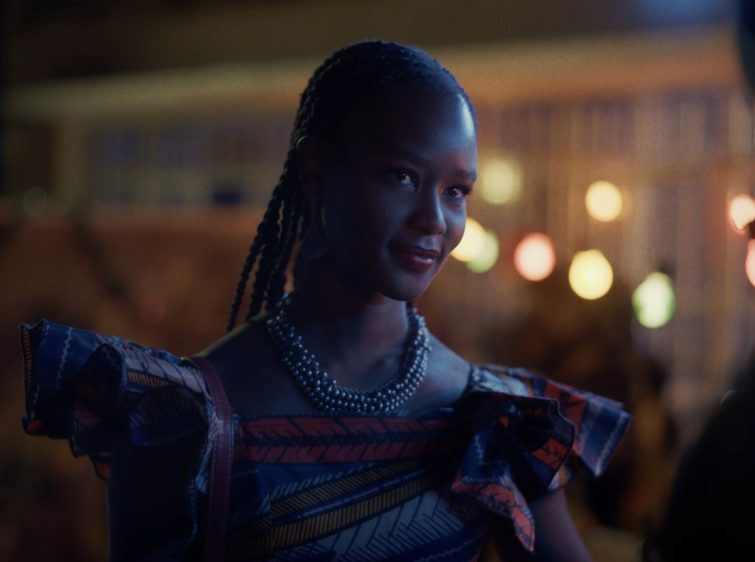
With conflict currently erupting in Sudan, one could be forgiven for approaching Mohamed Kordofani’s “Goodbye Julia,” which takes place in Khartoum during the six years prior to the 2011 secession of South Sudan, as a worthy, topical history lesson. And it certainly does have merit as a primer for the class, ethnic and religious unrest that besets the troubled state. But what actually transpires is far more engaging, in the vein of Asghar Farhadi, wherein a tight, high-concept moral core unravels into strands of widening, deepening social consequence. Telling the story of a fraught friendship between two very different women, Kordofani’s intelligent, compassionate scripting ensures that the political never overwhelms the personal. Yet it also illuminates just how well the fault lines that divide a nation can map onto the rifts within a human heart divided against itself.
Mona (Eiman Yousif) is a wealthy Muslim from northern Sudan who abandoned her singing career at the behest of her husband Akram (Nazar Gomaa) and lives in a gated house in a well-to-do district. Julia (Siran Riyak) is a poor Christian southerner who, along with her husband Santino (Paulino Victor Bol) and son Daniel (played by Louis Daniel Ding and Stephanos James Peter at different ages), is living in a temporary shanty, having just been unfairly evicted. The women’s paths are not meant to cross — at most, Julia ought to be a peripheral presence, selling bread on the side of the road as Mona drives by. But one day, Mona accidentally strikes little Daniel with her car while driving distractedly through his neglected neighborhood.
Had she done the right thing and stayed to face the music, likely no further tragedy would have ensued. Instead, having ascertained that the boy is not seriously injured, Mona, infected with her husband’s paranoid racism towards the “slaves” from the south, drives off. Santino, enraged by the hit-and-run, gives chase on his motorcycle and Mona does the second unforgivable thing: She phones Akram to tell him she is being pursued, without giving him the reason why. When Santino pulls up behind her at her house, Akram is waiting with his gun, and shoots him dead. A neighbor stashes the motorbike. The police write the incident off, not even seeing fit to inform Santino’s family of his death. There is nothing to connect Mona to the missing man, except the increasingly loud voice of her conscience.
That voice drives her — unbeknownst to Akram, to whom she frequently white-lies — to bribe a police officer into finding the dead man’s family. Which is how Mona comes to pull up at the roadside where Julia sells her baked goods, and to buy up her whole stock. It doesn’t quell her guilt. And so, on a whim, Mona offers Julia a job as her live-in housekeeper, which Julia, all but homeless and now raising a small boy in the absence of his missing father, readily accepts. The scene is thus set for a melodrama of escalating tension in which Mona’s fragile house of cards, built on dubiously well-meant deceptions, threatens to collapse.
But Kordofani has a more humane story to tell, in which his characters, as beautifully played by two actors mining an easy chemistry, are more than archetypes within a ticking-clock plot. Across the divides of rich and poor, Muslim and Christian, north and south, light-skinned and dark, Mona and Julia become friends. Mona sponsors Daniel’s schooling and later his apprenticeship with Akram, who, despite initially disinfecting his hands whenever Daniel touches him, has grown into a father-figure, unwittingly replacing the man he killed. Julia, in turn, becomes Mona’s irreverent confidante, encouraging her to defy her husband’s edict and take up singing again. But in a neat parallel with the state of Sudanese society by late 2010, it seems that no matter how closely bonded you might have become to your neighbor, sometimes the weight of a long, cruel history demands separation.
Both women are equally flattered by Pierre de Villiers’s warm, close-up-rich photography, but Julia remains the less well-developed. Then again, despite her relative poverty and being on the sharp end of every -ism (colorism, racism, sexism, ethnocentrism) that bedevils Khartoum at this moment in time, Julia has from the outset the freer spirit; it is Mona who is most in need of change. The metaphor is on the nose, but when Akram gifts Mona a canary in a cage, inevitably, she releases it, against his protests that it will not survive on its own. That is perhaps true of all caged creatures. But at least, for a time, they get to sing in freedom, and for Mona, and for a divided Sudan, the song is worth the risk.













